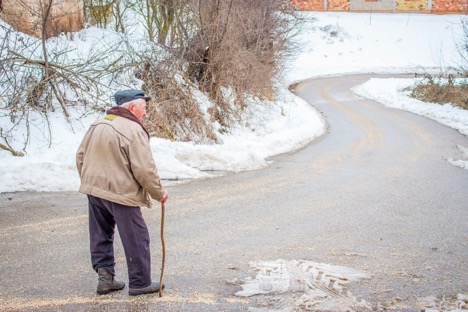Israel-Hamas war live: destruction affecting Gaza hospitals ‘becoming unbearable’, says Red Cross; evacuations to Egypt suspended | Israel-Hamas war
Destruction affecting Gaza hospitals ‘becoming unbearable’, says Red Cross
The International Committee of the Red Cross (ICRC) has warned that the healthcare system in Gaza has “reached a point of no return” amid escalating violence that have “severely” affected hospitals and ambulances working in the besieged Palestinian territory.
In a statement on Friday, the ICRC said attacks on medical facilities and personnel have dealt a “heavy blow” to Gaza’s healthcare system – already “severely weakened” after more than a month of heavy fighting – and which is “taking a heavy toll” on civilians, patients and medical staff.
William Schomburg, head of ICRC sub-delegation in Gaza, said:
The destruction affecting hospitals in Gaza is becoming unbearable and needs to stop. The lives of thousands of civilians, patients and medical staff are at risk.
Children’s hospitals have not been spared from the violence, the organisation says, including the “heavily damaged” al-Nasser hospital and al-Rantisi hospital, which has had to cease its operations.
Noting that the al-Shifa medical complex now hosts thousands of displaced families, it said any military operation around hospitals “must consider the presence of civilians, who are protected under international humanitarian law”.
The ICRC urgently called for the respect and protection of medical facilities, patients and healthcare workers in Gaza.
Key events
Crowds of people marched through the centre of Jenin in the occupied West Bank on Friday for the funerals of Palestinians killed during a raid by the Israel Defence Forces (IDF).
As the Israeli offensive in Gaza continues, violence in the occupied West Bank is escalating. Nineteen Palestinians were killed across the territory on Thursday as clashes took place with the IDF.
According to Israeli media quoting IDF statements, the IDF launched a counter-terrorism operation during which forces exchanged fire with armed terrorists.
Jenin has long been a flashpoint between Hamas and Israeli security forces, outside the practical control of the Palestinian Authority in Ramallah and a stronghold of Hamas and Islamic Jihad.

Emily Dugan
A letter to the British Medical Association signed by 2,900 doctors, as well as other BMA members, was sent on Friday to demand more action and stronger support of Palestinians.
“Our medical colleagues in Gaza are exhausted and essential resources needed to care for patients are running out,” it said.
This situation is not sustainable or humane, and is categorically morally and legally unacceptable.
The letter expressed “grave concern at the increasing political repression of those calling for a ceasefire and freedom for the Palestinian people”.
Medics have said they feel abandoned in Gaza, where as of last week more than a third of hospitals were no longer functioning.
Mohammed Zaqout, director-general of Gaza hospitals, said on Friday they were facing a “catastrophic situation” without electricity, water or food.
We are unable to provide services to the wounded and the hospitals are continuously bombed by Israel.

Emily Dugan
British healthcare workers in uniform protested outside Downing Street on Friday to commemorate almost 200 clinicians killed in Gaza since Israel’s bombardment began.
The vigil was organised to call on Rishi Sunak to push for an urgent ceasefire.
Many of the hospital workers taking part carried one of 189 different placards bearing the name of a healthcare worker killed in Gaza in the past month. Organisers said that in the time it took for the names to be printed, several more would have died.
Hospitals continue to be targeted in Gaza, with its largest hospital, al-Shifa, hit by Israeli fire early on Friday morning. The Israeli army claims Hamas hides in and under hospitals and has set up a command centre beneath al-Shifa – which hospital staff deny.
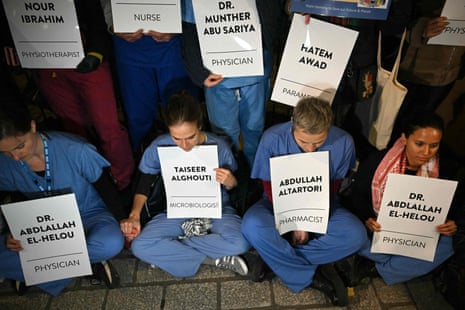
Evacuations from Gaza to Egypt suspended – report
Evacuations from the Gaza Strip into Egypt for foreign passport holders and for injured Palestinians requiring urgent medical treatment were suspended on Friday, Reuters reported, citing three Egyptian security sources and a Palestinian official.
The suspension was due to problems bringing medical evacuees to the Rafah crossing from inside Gaza, according to the Palestinian official and an Egyptian medical source.
Several dozen foreign passport holders and their dependents, as well as a small number of medical evacuees had entered Egypt on Friday before crossings were suspended, the Egyptian sources said.
The Rafah crossing reopened on Thursday for limited evacuations after being suspended again earlier this week due to what the US state department referred to as unspecified “security circumstance”.
Nearly 700 foreign passport holders and dependents were reportedly able to leave Gaza through the crossing on Thursday as well as 12 medical evacuees and 10 companions.
Israel is considering a deal for Hamas to release all civilian hostages held in Gaza, according to a report.
Hamas and Israel are negotiating two hostage release proposals, the New York Times reported today, citing officials briefed on the talks. Qatar has been the main meditator in the talks, with senior US officials also involved, it said.
Under one of the proposals being discussed, Hamas would release 10 to 20 civilian hostages – including Israeli women and children as well as foreigners, including Americans – in exchange for a brief pause in fighting, one official said. That could be followed by a release of about 100 civilians if terms are met, they said.
In exchange, Hamas is asking for a brief pause, more humanitarian aid, fuel for hospitals and the release of women and children in Israeli prisons, according to the source. An official said Israeli authorities have expressed uncertainty about releasing their prisoners.
Hamas and other Palestinian groups are holding about 240 people hostage in Gaza, according to Israeli officials. Less than half of them are civilians, one official said.
Hamas has refused to release any of the military-age Israeli men it is holding in Gaza, officials said.
A senior official in the militant group Palestinian Islamic Jihad has denied what he said were Israeli claims that al-Shifa hospital in Gaza was being used by Palestinian fighters.
Mohamad al-Hindi, Islamic Jihad’s deputy secretary general, said Israel could reach al-Shifa hospital “within hours” and that claims the hospital was a resistance base were “false”, AP reported.
“Not one bullet was fired from Shifa hospital or any other hospital,” he said.
Israel has claimed that Hamas has placed parts of its military tunnel system and command network under civilian objects including al-Shifa hospital, the largest hospital in Gaza. Last month, the Israel Defence Forces (IDF) released an infographic depicting what it said was Hamas’s command HQ under the hospital.
Hamas has denied allegations that the group was using the Shifa hospital as a shield for its underground military infrastructure, and said the claims have “no basis in truth”.
Three women appeared in a British court on Friday and pleaded not guilty to terrorism offences after they were pictured at a pro-Palestinian march in London carrying photos of paragliders.
Heba Alhayek, 29, Pauline Ankunda, 26, and Noimutu Olayinka Taiwo, 27, were charged “with single counts of carrying or displaying an article, namely an image displaying a paraglider, to arouse reasonable suspicion that they are supporters of a proscribed organisation, namely Hamas, on Saturday 14 October 2023”, the Crown Prosecution Service said.
The three women entered not guilty pleas to one count under the Terrorism Act and will stand trial at the same court in February.
The incident happened on 14 October in Whitehall during a march after the 7 October attack on Israel, when Hamas militants used paragliders to cross the border between Gaza and Israel.
Prosecutor Mark Luckett said:
The prosecution say that there is a clear and unique association between the image of a paraglider and the Hamas terrorist attack a week earlier.
He added that displaying an item associated with the Hamas attacks, particularly at a pro-Palestinian demonstration, “glorifies the actions of the group by celebrating the unique, successful tactic used by them”.
Thousands of Palestinians continued to flee south from northern Gaza on Friday a day after the White House announced that Israel would begin to implement four-hour “humanitarian pauses” in parts of the area to allow people to leave.
The US national security spokesperson, John Kirby, on Thursday said the pauses would allow people to pass along two humanitarian corridors.
Despite the US announcement on Thursday, there have been no immediate reports of a lull in fighting in northern Gaza. The Israeli military has said there will be “tactical, local pauses for humanitarian aid for Gazan civilians” but “no ceasefire”.
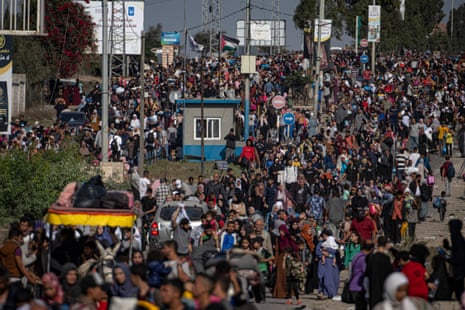

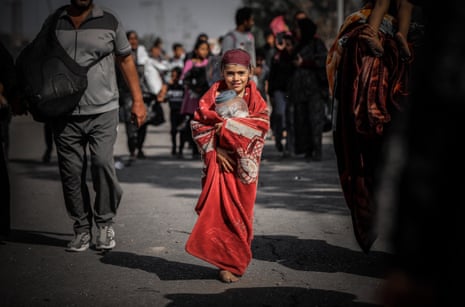
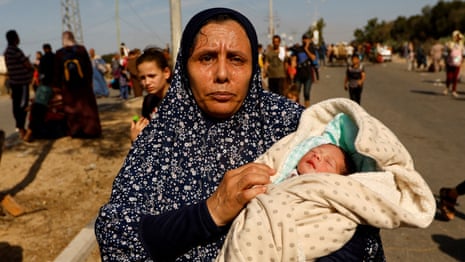

Patrick Wintour
Israel has killed a further seven Hezbollah fighters on its northern border with Lebanon, taking the total death toll of Hezbollah fighters to 78 since the Hamas attack on Israel on 7 October.
The rising death toll in Lebanon and the killing of 18 Palestinians by Israeli security forces in the West Bank on Thursday prompted the Iranian foreign minister, Hossein Amir-Abdollahian, to declare that a wider regional escalation of the conflict was inevitable.
Hezbollah, the Lebanese political and militant group and Iran’s most prominent proxy movement, named the seven fighters in a statement that said they were “martyred on the road to Jerusalem”, the phrase Hezbollah often uses to record deaths. The Hezbollah death toll now well exceeds the numbers killed in the 2006 war with Israel, prompting internal debates about its next steps.
The group’s leader, Hassan Nasrallah, will make his second speech this month on Saturday, setting out his latest thinking. He ended his last one-hour speech on 3 November by saying he was leaving all military options on the table and that this dispute with Israel was of a different order to all its predecessors.
One person killed, many children wounded after Israeli snipers target al-Quds hospital, according to Palestinian Red Crescent
The Red Cross statement calling for the protection of patients, healthcare workers, medical facilities in Gaza comes as the Palestinian Red Crescent Society (PCRS) said Israeli forces opened fire on the intensive care unit at al-Quds hospital in Gaza City.
One person was killed and 28 others were wounded in sniper fire by Israeli forces at the hospital, the organisation said.
The majority of the injured were children, it said, two of whom are in critical condition.
Destruction affecting Gaza hospitals ‘becoming unbearable’, says Red Cross
The International Committee of the Red Cross (ICRC) has warned that the healthcare system in Gaza has “reached a point of no return” amid escalating violence that have “severely” affected hospitals and ambulances working in the besieged Palestinian territory.
In a statement on Friday, the ICRC said attacks on medical facilities and personnel have dealt a “heavy blow” to Gaza’s healthcare system – already “severely weakened” after more than a month of heavy fighting – and which is “taking a heavy toll” on civilians, patients and medical staff.
William Schomburg, head of ICRC sub-delegation in Gaza, said:
The destruction affecting hospitals in Gaza is becoming unbearable and needs to stop. The lives of thousands of civilians, patients and medical staff are at risk.
Children’s hospitals have not been spared from the violence, the organisation says, including the “heavily damaged” al-Nasser hospital and al-Rantisi hospital, which has had to cease its operations.
Noting that the al-Shifa medical complex now hosts thousands of displaced families, it said any military operation around hospitals “must consider the presence of civilians, who are protected under international humanitarian law”.
The ICRC urgently called for the respect and protection of medical facilities, patients and healthcare workers in Gaza.

Jason Burke
The Israel Defence Forces (IDF) spokesperson Lt Col Richard Hecht has said that the Israeli military was maintaining its focus on Hamas in Gaza despite sporadic attacks on Israel from Lebanon and Syria involving drones.
During a press briefing on Friday, Hecht said that in Gaza the IDF last night “took out” two commanders in Hamas’s elite Nukhba forces: one who was involved in the attacks into Israel on 7 October which killed 1,400 people, mainly civilians, and the head of the Islamist organisation’s sniper teams in the north of Gaza.
Rocket fire is continuing out of Gaza aimed at Tel Aviv, he told reporters.
Answering questions about the IDF advance towards al-Shifa hospital, in the centre of Gaza City, which is full of seriously wounded or otherwise incapacitated patients, Hecht said the IDF was aware of the sensitivities of the hospitals in Gaza. He said:
The IDF does not fire on hostages but if we see a Hamas terrorist we will kill him.
The IDF has repeatedly claimed that Hamas is using the hospitals and similar sites to shield military installations, and using ambulances to transport militants.

Jason Burke
At 8.30 on Friday morning, Jenin’s morgue was crowded. Outside, dozens of young men in black baseball caps, T-shirts and jeans stood quietly, some with their weapons between their knees, their green Hamas headbands tied tight across their foreheads. Older men sat in front of shuttered shops.
Inside, a metal door was opened and a corpse wrapped in the green flag of Hamas was drawn out on a stretcher. A teenager with an assault rifle in one hand touched the dead man lightly on the forehead, then helped to shoulder the stretcher and with five others set out through the throng, down the rubble-strewn streets to the home of Hamed Fayed, where the women of the family waited.
Moments later, a second body, wrapped in the black flag of Islamic Jihad, was carried out. Then a third body, a fourth, and more.
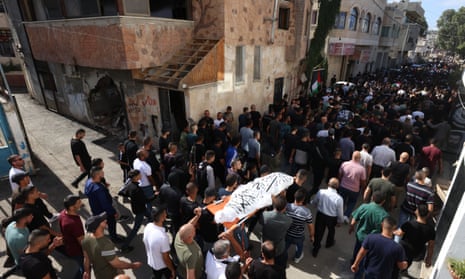
As the Israeli offensive in Gaza continues, a month after the Hamas attacks that killed 1,400 Israelis, mainly civilians, and wounded many more, levels of violence in the occupied West Bank are rising fast.
Nineteen Palestinians were killed across the territory on Thursday as clashes took place with the Israel Defence Forces (IDF), 14 in the small northern town of Jenin. Casualties were aged from 15 to 40, and included several civilians.
Since 7 October, 167 Palestinians have been killed by Israeli forces in the West Bank; and a further eight, including one child, have been killed by Israeli settlers. Three Israelis have been killed in attacks by Palestinians according to the UN.
Ziad, a 35-year-old Palestinian, recounts another day in Gaza when, amid the hunger and the shortages, an interminable queue for breakfast becomes a ‘falafel journey’ for her diary in the Guardian:
Thursday 9 November
8am Falafel is one of the most popular traditional foods in Gaza. We call it “the poor people’s food” because it is cheap. Palestinians who travel abroad are surprised at the prices of falafel sandwiches, and I know I speak for everyone in Gaza when I say that we believe the ones made in Gaza are the best.
Luckily for us, in the area we evacuated to there were two shops selling falafel. Unfortunately, one closed soon after we arrived because the owner ran out of gas. But we are among the few neighbourhoods that still have the luxury of getting falafel. The remaining shop works two shifts, one in the morning and one from 3 to 5pm. They no longer sell sandwiches, only falafel, since getting bread is very difficult. I usually go in the evening, because until recently we didn’t eat breakfast. I would wait for about 45 minutes to get my order, but it is OK: now you have to wait for everything, if it is available.
Today, I decide to get some falafel for breakfast. I thought I went early, but the line is so long. I am told that people start queueing shortly after 6am to secure a spot. I try to count how many people are ahead of me and get tired after 85. I see my friend so we stand together and decide to spend “the journey of getting falafel” together. I send a message to my sister telling her it will probably take me a long time to return.
The largest hospital in Gaza, where up to 50,000 people are sheltering, is facing bombardment, the World Health Organization has said.
Palestinian officials said Israel launched airstrikes on or near at least three hospitals on Friday, as the US secretary of state, Antony Blinken, warned that “far too many Palestinians have been killed” in the war.
Night-time footage shows people gathered outside al-Shifa hospital in Gaza City. An explosion can be heard and people are seen shouting and fleeing from the site. Margaret Harris, a WHO spokesperson, said 20 hospitals in Gaza were out of action and that there was “intense violence” at Shifa.

Damien Gayle
In the UK, two dozen climate justice groups have written to Ed Miliband, the shadow secretary of state for energy and net zero, describing his party’s refusal to support a ceasefire in Gaza a “disastrous moral abdication”.
Keir Starmer, Labour’s leader, faces a growing rebellion over his stance on Gaza, which has included saying that Israel had a right to cut off Palestinians’ power and water supplies. Sources say Starmer faces a string of potential resignations from his parliamentary team over his refusal to call for a ceasefire.
But Miliband, himself a former Labour leader, has so far remained silent. “We find this silence even more unconscionable given the unprecedented scale of the catastrophe facing the Palestinian people in this moment,” the letter, signed by Labour for a Green New Deal, Extinction Rebellion and War on Want, among others, says.
It continues:
The Labour leadership’s refusal to back a ceasefire is a disastrous moral abdication. The notion of a ‘humanitarian pause’ to such an unspeakable crime is insulting: it will not end this mass killing. That’s why we support those frontbench Labour MPs who have publicly called for a ceasefire.
For the Palestinian people, for the planet, and for the sake of your ethical standing and legacy as a political leader, we implore you to immediately speak out for a ceasefire.”
The letter, which was sent to Miliband on Thursday afternoon, notes that Miliband did call for a ceasefire during Israel’s campaign in Gaza in 2014 when he was Labour leader. The 50-day war killed more than 2,100 Palestinians.
🚨BREAKING: 25 leading UK climate justice groups have condemned Labour’s refusal to demand an end to Israel’s mass killing in Gaza.
In the letter to @Ed_Miliband, we highlight the links between the Palestinian cause & the climate crisis, and implore him to call for a ceasefire. pic.twitter.com/ZNuEWDHGEN
— Labour for a Green New Deal (@LabGND) November 10, 2023
It’s just past 6pm in Gaza City and Tel Aviv, here are the latest developments:
-
Palestinian officials said Friday that Israeli airstrikes hit three Gaza hospitals and a school on Friday, killing at least 22 people, and a ground battle was under way at another hospital, further stressing the Palestinian territory’s crumbling health system as it struggles to cope with thousands of people wounded or displaced in Israel’s war against Hamas militants. A senior Israeli security official said initial findings indicated that one strike at Shifa was the result of a misfire by militants. The Israeli army has alleged that Hamas hides in and under hospitals and that it has set up a command centre under Shifa – claims the militant group and hospital staff deny.
-
The US secretary of state, Antony Blinken, says “far too many” Palestinians have died. While Blinken said the US “appreciates” Israel’s steps to minimise civilian casualties, he said it was not enough. He said the US has proposed additional ideas to the Israelis, including longer “humanitarian pauses” and expanding the amount of assistance getting into Gaza.
-
The number of people killed in Gaza by Israeli military actions since the start of the war on 7 October has risen to 11,078, including 4,506 children, according to the Hamas-run health ministry. Another 27,490 Palestinians in Gaza have been wounded, it said.
-
The UN’s human rights chief, Volker Türk, has called for an investigation into what he described as Israel’s “indiscriminate” bombardment and shelling in densely populated areas in the Gaza Strip. “The extensive Israeli bombardment of Gaza, including the use of high-impact explosive weapons in densely populated areas … is clearly having a devastating humanitarian and human rights impact,” Türk told reporters in Jordan. “The attacks must be investigated … We have very serious concerns that these amount to disproportionate attacks in breach of international humanitarian law.”
-
Hamas fires rockets deep into Israel, setting off sirens in Tel Aviv. Medics reported two women in Tel Aviv suffered shrapnel wounds from the salvo.
-
Benjamin Netanyahu has said Israel does not seek to conquer, occupy or govern Gaza after its war against Hamas, but a “credible force” would be needed to enter the Palestinian territory if necessary to prevent the emergence of militant threats.
-
Earlier, the Guardian reported that Benjamin Netanyahu rejected a deal for a five-day ceasefire with Palestinian militant groups in Gaza in return for the release of some of the hostages held in the territory early in the war, according to sources familiar with the negotiations.
-
Israeli officials say that a Gaza evacuation corridor opens for a sixth day. Cogat, the Israeli military civil body responsible for government policy in the occupied Palestinian territories, said the corridor will remain open for seven hours.
-
Food shortages affecting every single person in Gaza, a spokesperson for the UN’s World Food Programme has said. “We can safely say that 100% are food insecure at this moment,” said Kyung-nan Park, the director of emergencies for the UN agency.
-
The IDF has confirmed it struck what it said was a group in Syria that was responsible for a drone that hit a school in the southern Israeli city of Eilat on Thursday. The military did not say what organisation in Syria had launched the drone. It said: “The IDF holds the Syrian regime fully responsible for every terror activity emanating from its territory.”
-
The White House announced earlier that Israel would begin to implement four-hour “humanitarian pauses” in parts of northern Gaza to allow people to leave. But there are yet to be clear signs of this taking place. The Israeli military has said it has not agreed to a ceasefire but that it will continue to allow “tactical, local pauses” to let in humanitarian aid into Gaza. Any plans for short-term pauses in the fighting in Gaza must be carried out in coordination with the UN and after agreement by all sides to be “truly effective”, a UN spokesperson Stéphane Dujarric has said.
-
In Israel, healthcare professionals and the families of hostages and their supporters held a demonstration outside the International Committee of the Red Cros (ICRC) headquarters in Tel Aviv on 9 November. They were calling on the organisation to demand access to visit and treat the hostages still being held inside Gaza.
-
A UN report paints a stark picture of the Palestinian economy after a month of war and Israel’s near-total siege of Gaza. The gross domestic product shrank 4% in the West Bank and Gaza in the war’s first month, sending more than 400,000 people into poverty – an economic impact unseen in the conflicts in Syria and Ukraine, or any previous Israel-Hamas war, the UN said.


